Posts Tagged ‘Adam Michnik’
PEN Journey 22: Warsaw—Farewell to the 20th Century
PEN International celebrates its Centenary in 2021. I’ve been active in PEN for more than 30 years in various positions and now as an International Vice President Emeritus. With memories stirring and file drawers of documents and correspondence bulging, I am a bit of a walking archive and have been asked by PEN International to write down memories. I hope this personal PEN journey will be of interest.
Bombs had been falling for months on Serbia when the 66th PEN Congress convened in Warsaw June 1999. The NATO assault—one of the last major campaigns of the Balkans War—ended just a week before the Congress opened. These events stirred debate at the Congress whose theme Farewell to the 20th Century caused delegates to look back as well as forward in deliberations.
The past included Warsaw’s history as well as its proximity (and a post-Congress trip) to Kraków and to the concentration camps of Auschwitz and Birkenau. I didn’t join the PEN trip, but during the Congress, I went on my own one day to these memorials of World War II’s terrible past so that I could walk and think alone among the empty crowded bunks, the piles of shoes, the ovens…
The Warsaw Congress was my first trip to Poland though not my last and my first visit to a concentration camp, though not my last.
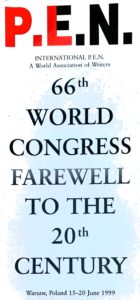
Program for PEN International Congress, Warsaw, Poland, 1999
The wars of the 20th Century both past and current were a problematic platform upon which to launch into the new Millennium, yet the century also was a time of citizens coming together and speaking out in such organizations as PEN. One of the panels at the Congress included the topic: the Role of International Writers’ Organizations in the 20th Century and their Association with UNESCO. An arcane topic perhaps, but one that begged a longer look at the future of the global organization of civil society.
PEN International President Homero Aridjis addressed the Assembly of Delegates from over 70 PEN centres, noting, “Ever since the day twelve weeks ago when the NATO bombing of Serbia began and a tidal wave of refugees from Kosovo overwhelmed neighboring countries, I have been thinking about what writers can do when war breaks out, and when ethnic rivalries and deep-rooted hatreds flare up, and about whether and how what we do can help prevent conflicts from reaching the point of explosion, when people are forced to abandon their homes and flee across borders. PEN is experienced in assisting writers who suffer in these situations, whether they are victims of censorship or their personal safety is threatened. But what is the nature of our commitment to the peaceful resolution of conflict? Or is the use of force legitimate to achieve aims which may seem unattainable otherwise?
“Writers around the world, but especially in the United States and Europe, reacted vehemently to the situation in the Balkans and often clashed,” he said. “Accusations flew back and forth across the Atlantic and were widely aired in the written and broadcast media. I myself was repeatedly asked to give PEN’s position on the conflict, and found myself bound by the principles expressed in PEN’s Charter, and by our commitments to protect and defend individual writers who are threatened and to uphold freedom of expression wherever it is under siege. An important part of our response is, of course, through the PEN Emergency Fund, where the thorough research always done by PEN ensures that assistance goes to truly deserving individuals. A new PEN endeavor may also soon be taking shape in the form of a writers in exile network, although that is still in a fledgling state…
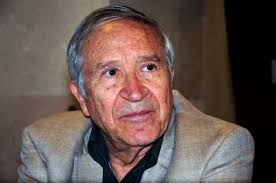
PEN Int’l President Homero Aridjis
“The so-called “humanitarian war” in Serbia and Kosovo provoked another war among intellectuals who were for or against NATO’s armed intervention,” he said. “After the Russian Revolution and the fascist and Nazi movements which lead to World War II and the dictatorships of Hitler and Stalin, and after dozens of petty or powerful dictators who tortured and murdered writers and journalists in many countries and continents throughout the twentieth century, this seems to be the first war since the fall of the Berlin Wall which has pitted writers against each other. Peter Handke, Susan Sontag, Salman Rushdie, Bernard-Henri Levy, Andre Glucksmann, Norman Mailer, Harold Pinter, Mario Vargas Llosa, Gabriel Garcia Marquez, Jose Saramago and Alexander Solzhenitzyn, among others, came down strongly on either side. Various writers from the Balkan region gave their views in Bled (at PEN’s Peace Committee meeting) at the end of May…
“The theme of this congress is to bid farewell to the 20th century before it is over, to say goodbye to this century which dawned upon a world ruled by a host of imperial and colonial powers such as Britain, France, Spain, Portugal, Belgium, Italy, the Netherlands, Austria, Russia and the Ottoman Empire. This century also witnessed the rise and fall of the Third Reich and the Soviet bloc,” he added. “The age of empires has apparently drawn to a close, giving way to dominance by individual countries, economic unions and multinational corporations, and by new alliances, including the United Nations. NATO, the European Union and the World Trade Organization. International PEN, founded in London in 1921, is probably one of the century’s oldest international alliances and will move into the 21st Century firm in its defense of freedom of expression and human rights of professional wordsmiths…
“Here in Warsaw we are only 300 kilometers from Auschwitz-Birkenau, the largest of the Nazi extermination camps. Although many writers and poets have borne witness to the Holocaust, and it has been described in countless chronicles, documentaries and books, it will never create to cause us indescribable horror, nor will we ever be able to grasp it fully…
“This year people around the world will perform the collective ritual of pondering over the last ten centuries. The media will bombard us with lists of events accompanied by examinations of conscience, and natural disasters, violations of human rights, social conflicts and environmental destruction will be weighed against advances in public health, literacy and communications, the spread of democracy, and the works of writers…
“As for PEN, what I would like to see accomplished at the start of the 21st century is the creation of more Centers in Africa, Asia, and Latin American, and the strengthening of existing Centres on those continents and on Eastern Europe so that PEN may become a truly global organization…”
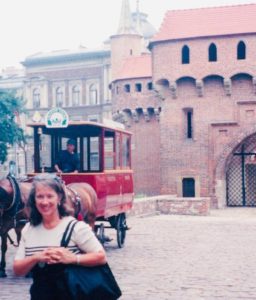
Visit to Krakow during 1999 PEN International Congress
This vision has been in part realized as PEN has expanded in the 21st century on all continents and an Exile Network institutionalized years later in partnership with the International Cities of Refuge Network. PEN has continued to advance its work in freedom of expression through the Writers in Prison Committee and its work with women through the Women’s Committee and with minority languages and translation through the Translation and Linguistic Rights Committee. As for peace, PEN is not a “peace organization” though it has a Peace Committee (see PEN Journey 14), but it doesn’t have tools to bring about peace on a global scale. However, debate and discussion among its members has had impact (see PEN Journey 6) since writers are the expounders of ideas which work for ill or good.
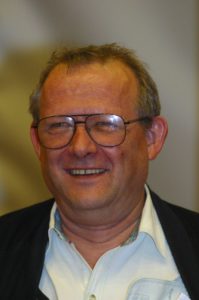
Adam Michnik, Photo credit: Albert Zawada/Agencja Gazeta
At the Warsaw Congress delegates visited Gazeta Wyborcza, the daily newspaper whose editor Adam Michnik was one of the intellectual authors of the Solidarity Movement that eventually led to the overthrow of the Communist hold on Poland. The paper in its rabbit-warren offices if memory recalls correctly, was the first independent newspaper published outside the communist government’s control since the late 1940’s. During the visit Adam Michnik offered to have Gazeta write an article about one of PEN’s cases in Chile of an arrested publisher and editor; however, shortly after the Congress, the publisher was released.
Through most of the years of the Cold War Polish PEN had managed to operate within the PEN family. After the Communist regime fell, Polish PEN was particularly effective in working on behalf of writers who were imprisoned under communist dictatorships such as in Vietnam.
PEN itself was reshaping into a more democratically governed organization. At the Warsaw Congress the first Executive Committee (later called the Board) was elected. After the 1998 Helsinki Congress, a call went out for nominations and a vote for PEN’s first Search Committee whose task was to facilitate the nomination of qualified candidates. Twenty-four people received at least two nominations for the Search committee, and five people were elected by postal vote: Kjell Olaf Jensen (Norwegian PEN), Lucina Kathman (San Miguel Allende PEN), Eric Lax (USA West PEN), Judith Rodriguez (Melbourne PEN) and myself. We met as a committee only once in person at the Warsaw Congress; most business was conducted via conference calls, faxes and some email, though not everyone had email at that time. We helped set out guidelines for the Search Committee and worked to assure there was a wide and diverse range of candidates for the first Executive Committee of PEN.
Fourteen candidates from every continent were nominated for the seven positions on the Executive Committee which was elected at the Warsaw Congress. PEN’s first Executive Committee included Carles Torner (Catalan Center), Vincent Magombe (African Writers Abroad Center), Gloria Guardia (Colombian Center), Niels Barfoed (Danish Center), Fawzia Assaad (Swiss Romande Center), Takashi Moriyama (Japanese Center), Marian Botsford-Fraser (Canadian Center). The four with the most votes received three-year terms and three members received two-year terms; thereafter elections occurred on a staggered basis.
PEN had decided against requiring regional representation on the board though hoped this might occur naturally. The first Executive Committee represented centers in Europe, Asia, Africa and North and South America. Now the challenge was for everyone to figure out how to operate in the 21st Century…
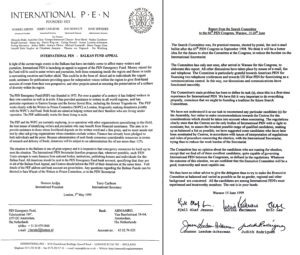
Next Installment: PEN Journey 23: Nepal–WIPC Crossing the Bridge Between People